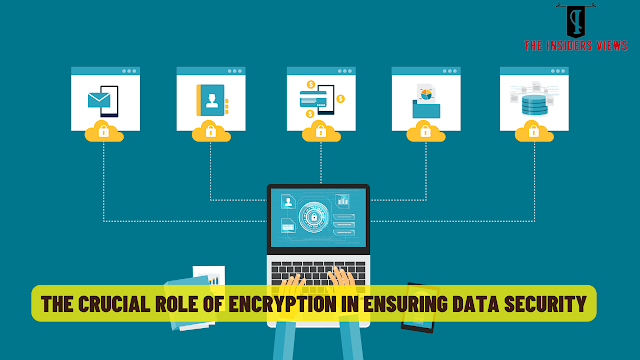The Crucial Role of Encryption in Ensuring Data Security
In today's era of digitalization, safeguarding sensitive data holds paramount importance. With the ever-growing prevalence of cyber threats and data breaches, individuals and businesses are relentlessly seeking effective measures to protect their invaluable information. Encryption emerges as a vital method that plays a pivotal role in ensuring data security. It involves the process of converting plain text into an encoded format that can only be deciphered with a confidential key. This article explores the significant role of encryption in data security and how it effectively safeguards confidential information from unauthorized access.
 |
| The Crucial Role of Encryption in Ensuring Data Security |
Understanding Encryption
Encryption serves as the fundamental pillar of secure communication and information exchange within the digital realm. It encompasses intricate algorithms that transform data into an incomprehensible format known as ciphertext. Decrypting the ciphertext and reverting it to its original form is only possible with the correct decryption key. By employing encryption techniques, sensitive data becomes inaccessible to anyone lacking the essential key, thereby ensuring its utmost confidentiality.
The Significance of Encryption in Data Security
Data security stands as a critical concern for individuals, businesses, and organizations across diverse industries. Encryption plays a pivotal role in safeguarding sensitive information by offering the following key benefits:
Confidentiality: Safeguarding Data against Unauthorized Access
Encryption guarantees the confidentiality of data by rendering it indecipherable to unauthorized parties. Even if an attacker gains access to encrypted data, comprehending its meaning without the decryption key becomes an insurmountable challenge. Consequently, confidential information remains secure and protected.
Integrity: Ensuring Data Authenticity and Trustworthiness
Encryption not only shields data from unauthorized access but also ensures its integrity. Through the application of digital signatures, encryption verifies the authenticity of data, confirming that it remains unaltered and unadulterated during transmission. This facet of encryption enhances trust and confidence in the information's integrity.
Compliance with Data Protection Regulations
With the implementation of stringent data protection regulations like the General Data Protection Regulation (GDPR), numerous businesses are legally obligated to protect sensitive data. Encryption serves as an indispensable component in adhering to these regulations, providing robust security measures for safeguarding personal and sensitive information.
Secure Data Transmission
Encryption plays a crucial role in securing data during transmission across networks. Whether it involves file transfers, email communication, or online transactions, encryption ensures that data remains encrypted throughout the entire process. Consequently, interception and unauthorized access by malicious actors are effectively prevented.
Protection Against Data Breaches
Data breaches have emerged as a pervasive threat in today's digital landscape. Cybercriminals continually strive to exploit vulnerabilities and gain unauthorized access to sensitive data. Encryption functions as a powerful defense mechanism, rendering any breached data useless without the corresponding decryption key.
How Encryption Works
To grasp the role of encryption in data security comprehensively, it is essential to understand its underlying mechanisms. Encryption primarily relies on two key components: an encryption algorithm and a key.
Encryption Algorithm
An encryption algorithm represents a complex mathematical function that converts plain text into ciphertext. Numerous encryption algorithms exist, each possessing unique strengths and application areas. Prominent examples of encryption algorithms include Advanced Encryption Standard (AES), RSA, and Triple Data Encryption Standard (3DES). These algorithms employ distinct methodologies to scramble data, thus ensuring its utmost confidentiality.
Encryption Key
An encryption key represents a unique value or set of values used for encrypting and decrypting data. It serves as both a lock and a corresponding key required to unlock and access the encrypted data. Depending on the encryption algorithm employed, keys can be either symmetric or asymmetric. Symmetric encryption employs the same key for both encryption and decryption purposes, whereas asymmetric encryption utilizes a pair of keys: a public key for encryption and a private key for decryption.
Frequently Asked Questions (FAQs)
FAQ 1: What role does encryption play in data security?
Encryption plays a crucial role in data security by safeguarding sensitive information from unauthorized access. It ensures data confidentiality, integrity, and authenticity, making it an indispensable tool for protecting valuable information.
FAQ 2: How does encryption contribute to compliance with data protection regulations?
Numerous data protection regulations necessitate the implementation of security measures to safeguard sensitive data. Encryption serves as a vital component in compliance efforts, providing robust protection against unauthorized access and maintaining data privacy.
FAQ 3: Can encrypted data be decrypted without the encryption key?
No, encrypted data cannot be decrypted without the corresponding encryption key. Encryption algorithms are designed to be mathematically secure, making it virtually impossible to decrypt encrypted data and retrieve the original information without the correct key.
FAQ 4: Are there any downsides or challenges associated with encryption?
While encryption represents a powerful security measure, it can present challenges in terms of key management and performance impact. Efficient key management is crucial to ensuring the security and accessibility of encrypted data. Additionally, encryption processes can introduce some overhead, potentially affecting system performance, particularly in resource-constrained environments.
FAQ 5: Is encryption exclusively relevant to businesses and organizations?
No, encryption is relevant to both businesses and individuals. Any individual handling sensitive information, such as personal data, financial details, or intellectual property, can benefit from encryption. Individuals can leverage encryption to protect their personal data, secure online communications, and enhance privacy.
FAQ 6: Is encryption foolproof?
While encryption represents a highly effective security measure, it is not entirely foolproof. As technology advances, attackers continually devise new methods to exploit vulnerabilities. Hence, it is crucial to implement encryption alongside other security measures and best practices to establish a comprehensive and robust data security strategy.
Conclusion
The role of encryption in ensuring data security cannot be overstated. As technology advances and cyber threats evolve, safeguarding sensitive information becomes paramount. Encryption provides a powerful defense mechanism, ensuring data confidentiality, integrity, and authenticity. By leveraging encryption techniques, individuals and organizations can safeguard their invaluable information, comply with data protection regulations, and maintain the trust and confidence of their stakeholders.






Post a Comment